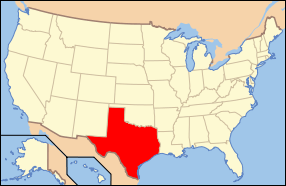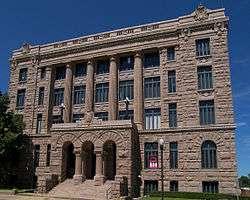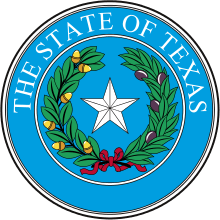Lamar County, Texas
| Lamar County, Texas | |
|---|---|
|
The Lamar County Courthouse in Paris | |
 Location in the U.S. state of Texas | |
 Texas's location in the U.S. | |
| Founded | 1841 |
| Named for | Mirabeau Buonaparte Lamar |
| Seat | Paris |
| Largest city | Paris |
| Area | |
| • Total | 933 sq mi (2,416 km2) |
| • Land | 907 sq mi (2,349 km2) |
| • Water | 26 sq mi (67 km2), 2.8% |
| Population | |
| • (2010) | 49,793 |
| • Density | 55/sq mi (21/km²) |
| Congressional district | 4th |
| Time zone | Central: UTC-6/-5 |
| Website |
www |
Lamar County is a county located in the U.S. state of Texas. As of the 2010 census, its population was 49,793.[1] Its county seat is Paris.[2] The county was formed by the Congress of the Republic of Texas on December 17, 1840 and organized the next year.[3][4] It is named for Mirabeau Buonaparte Lamar, the second president of Texas.[5]
Lamar County comprises the Paris, TX Micropolitan Statistical Area.
Lamar County, once heavily Democratic, is now represented in the Texas House of Representatives by the Republican Erwin Cain of Sulphur Springs, Texas. Republican Representative Marsha Farney, reared in Lamar County, represents District 20, which includes the northern portion of Williamson County in the Austin suburbs.
Geography
According to the U.S. Census Bureau, the county has a total area of 933 square miles (2,420 km2), of which 907 square miles (2,350 km2) is land and 926 square miles (2,400 km2) (2.8%) is water.[6]
Major highways
Adjacent counties
- Choctaw County, Oklahoma (north)
- Red River County (east)
- Delta County (south)
- Fannin County (west)
- Bryan County, Oklahoma (northwest)
Demographics
| Historical population | |||
|---|---|---|---|
| Census | Pop. | %± | |
| 1850 | 3,978 | — | |
| 1860 | 10,136 | 154.8% | |
| 1870 | 15,790 | 55.8% | |
| 1880 | 27,193 | 72.2% | |
| 1890 | 37,302 | 37.2% | |
| 1900 | 48,627 | 30.4% | |
| 1910 | 46,544 | −4.3% | |
| 1920 | 55,742 | 19.8% | |
| 1930 | 48,529 | −12.9% | |
| 1940 | 50,425 | 3.9% | |
| 1950 | 43,033 | −14.7% | |
| 1960 | 34,234 | −20.4% | |
| 1970 | 36,062 | 5.3% | |
| 1980 | 42,156 | 16.9% | |
| 1990 | 43,949 | 4.3% | |
| 2000 | 48,499 | 10.4% | |
| 2010 | 49,793 | 2.7% | |
| Est. 2015 | 49,440 | [7] | −0.7% |
| U.S. Decennial Census[8] 1850–2010[9] 2010–2014[1] | |||
As of the census[10] of 2000, there were 48,499 people, 19,077 households, and 13,468 families residing in the county. The population density was 53 people per square mile (20/km²). There were 21,113 housing units at an average density of 23 per square mile (9/km²). The racial makeup of the county was 82.46% White, 13.47% Black or African American, 1.08% Native American, 0.40% Asian, 0.02% Pacific Islander, 1.17% from other races, and 1.41% from two or more races. 3.33% of the population were Hispanic or Latino of any race.
There were 19,077 households out of which 32.30% had children under the age of 18 living with them, 54.00% were married couples living together, 13.20% had a female householder with no husband present, and 29.40% were non-families. 26.10% of all households were made up of individuals and 12.30% had someone living alone who was 65 years of age or older. The average household size was 2.48 and the average family size was 2.99.
In the county, the population was spread out with 26.10% under the age of 18, 8.60% from 18 to 24, 26.80% from 25 to 44, 22.90% from 45 to 64, and 15.60% who were 65 years of age or older. The median age was 37 years. For every 100 females there were 91.30 males. For every 100 females age 18 and over, there were 86.80 males.
The median income for a household in the county was $31,609, and the median income for a family was $38,359. Males had a median income of $30,539 versus $21,095 for females. The per capita income for the county was $17,000. About 12.80% of families and 16.40% of the population were below the poverty line, including 22.50% of those under age 18 and 14.30% of those age 65 or over.
Education
The following school districts serve Lamar County:
- Chisum ISD (small portion in Delta County)
- Fannindel ISD (mostly in Delta and Fannin counties; small portion in Hunt County)
- Honey Grove ISD (mostly in Fannin County)
- North Lamar ISD
- Paris ISD
- Prairiland ISD (small portion in Red River County)
- Roxton ISD
In addition, Paris Junior College serves the county.
Communities
Cities
- Blossom
- Deport (partly in Red River County)
- Paris (county seat)
- Reno
- Roxton
- Sun Valley
- Toco
Unincorporated Communities
See also
References
- 1 2 "State & County QuickFacts". United States Census Bureau. Retrieved December 19, 2013.
- ↑ "Find a County". National Association of Counties. Retrieved 2011-06-07.
- ↑ "Texas: Individual County Chronologies". Texas Atlas of Historical County Boundaries. The Newberry Library. 2008. Retrieved June 20, 2015.
- ↑ "Lamar County". Texas Almanac. Texas State Historical Association. Retrieved June 20, 2015.
- ↑ Gannett, Henry (1905). The Origin of Certain Place Names in the United States. Government Printing Office. p. 180.
- ↑ "2010 Census Gazetteer Files". United States Census Bureau. August 22, 2012. Retrieved May 3, 2015.
- ↑ "County Totals Dataset: Population, Population Change and Estimated Components of Population Change: April 1, 2010 to July 1, 2015". Retrieved July 2, 2016.
- ↑ "U.S. Decennial Census". United States Census Bureau. Retrieved May 3, 2015.
- ↑ "Texas Almanac: Population History of Counties from 1850–2010" (PDF). Texas Almanac. Retrieved May 3, 2015.
- ↑ "American FactFinder". United States Census Bureau. Retrieved 2011-05-14.
External links
- Lamar County government's website
- Lamar County in Handbook of Texas Online at the University of Texas
- Historic Lamar County materials, hosted by the Portal to Texas History
- Lamar County Texas information - Lamar County Station
 |
Bryan County, Oklahoma | Choctaw County, Oklahoma |  | |
| Fannin County | |
Red River County | ||
| ||||
| | ||||
| Delta County |
Coordinates: 33°40′N 95°34′W / 33.67°N 95.57°W

